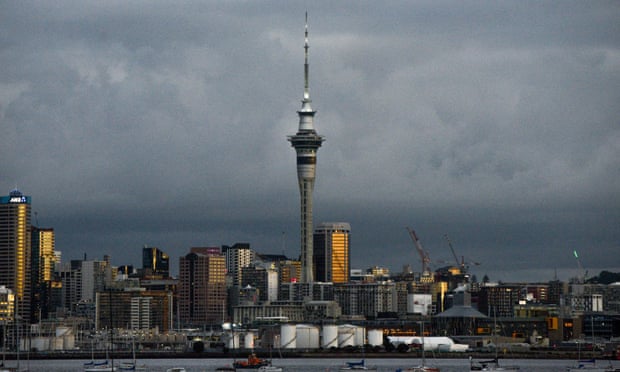Anger and grief: New Zealanders fearful as Covid elimination strategy ends
Concerns about the toll a suppression approach may take have dampened excitement about loosened restrictions
New Zealanders are grieving for the end of the country’s Covid elimination strategy and anxious about what the future holds, a day after prime minister Jacinda Ardern announced the country would switch to a suppression approach.
“It’s kind of a grieving for what we are losing,” microbiologist Siouxsie Wiles, one of the pandemic response’s most prominent science communicators, said. “We are very clearly losing alert level one, and the freedoms and privileges that come with [it].”
The country has held fast to a Covid-zero strategy for the past 18 months. That has been rewarded with some of the world’s best outcomes through the pandemic: extremely low hospitalisations and deaths, little in the way of day to day restrictions, low unemployment and robust economic survival. But on Monday, almost two months into a Delta outbreak, the country stepped into the unknown, pivoting for the first time away from strict elimination despite vaccination rates that remain low.
The shift was introduced by Ardern with a three-step plan to let people gather outdoors and reopen early childhood education, before reopening retail and hospitality. It comes at a time when just 40% of the full population and 47% of the eligible population (those aged 12 and over) are fully vaccinated, while 65% of the full population and 77% of the eligible population have had at least one dose.
Vaccination rates are particularly low among Māori, who are around two thirds behind the wider population. Health experts agree it will probably result in a further rise in cases – a proposition journalist Marc Daalder termed “level three: now with picnics and hospitalisations”. For a country that has never had to reckon with widespread transmission or illness from Covid-19, any excitement over loosened restrictions has been tempered with apprehension and, in some cases, anger at the toll that could lie ahead.
“We have actually had an incredible pandemic so far,” Wiles said, with open schools and businesses, and the continuation of relatively normal life. “Most of the rest of the world haven’t had that. Or if they’ve had it, it’s been really dangerous and people have gotten sick and some people have died. It’s not clear to me whether people have really got their head around that.”
Part of the sadness, Wiles said, was that elimination had proven to be a highly equitable strategy – it protected almost all New Zealanders. As the country shifted gears to allow an outbreak to spread through the community, outcomes would take the same course as it had across the rest of the world – skewed against poor people, those with disabilities, or ethnicities experiencing other forms of disadvantage.
“Our change in strategy is not going to be felt the same by every New Zealander. Those who are wealthy and privileged are going to still live a wealthy and privileged life, where they may not be touched – compared to other communities that may well end up being devastated by it. And that’s the hardest bit for me to get my head around,” Wiles said. “Here was a chance where we could have made things different. And we haven’t.”
Announcing the changes, Ardern said, “the activities that are being allowed are not considered high risk in our current situation. But, they will make a material difference in Aucklanders’ ability to maintain the restrictions that do make a difference.” Many Aucklanders will no doubt be relieved to once again see friends and family, and send young children to childcare – although with a week of rain forecast, picnics may not be imminent.
😭😆😭😆 pic.twitter.com/L1fCGfCObz
— Cassie Roma (she/her) (@cassieroma) October 4, 2021
But on social media, others expressed frustration and sadness. Psychologist Dr Sarb Johal said “People are apprehensive and grieving for the security that the old alert level system brought us for so long. Make no mistake, it is hard to let go.”
Some criticised the latest announcement as confusing – a departure from the country’s extremely clear pandemic communications. Communications consultant Neale Jones, an ex-Labour staffer, called the announcement “a long and confusing surrender note” and “both a policy and a political failure”. Strategy and communications professional Asher Wilson-Goldman said: “Today’s announcement is messy, complex and won’t keep people safe. This feels like capitulation at a time when we’ve still got plenty of vaccinating left to do.”
The Green party – typically the Labour government’s closest partner – broke with Ardern on Monday to say they opposed the policy, which would have too high a cost for vulnerable New Zealanders. “Elimination has protected thousands of lives in Aotearoa. We have to stay the course to keep everyone safe. Now is not the right time to change our approach, particularly when so many of our vulnerable communities are still at risk,” Green co-leader Marama Davidson said.
“The government’s planned roadmap out of Covid-19 has serious risks for our vulnerable communities – including Māori and Pasifika,” she said. “Elimination is still possible if we work together to stop the spread. Our public health system has held up so far, but we worry that easing restrictions too early could overwhelm the hard-working nurses, doctors and all health system workers who we rely on to keep us safe.”
Other political parties were also harsh on the decision. Libertarian Act party leader David Seymour said: “Being told we could afford a slow vaccine rollout because we didn’t have Covid in the community is one of the most reckless things any government in New Zealand has ever done and we are now paying the price.”

